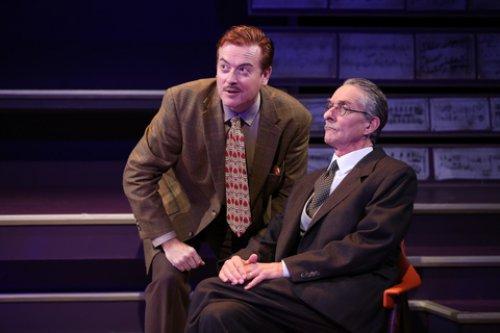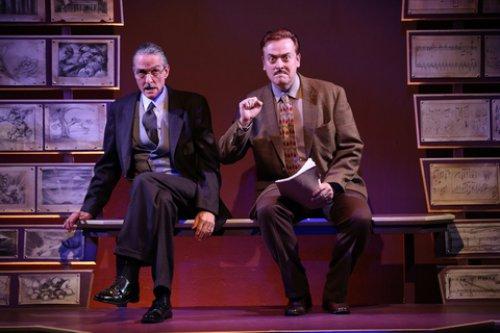Small World
American animator Walt Disney meets Russian composer Igor Stravinsky in three imagined encounters over the use of “Rite of Spring” for the film “Fantasia.”

Mark Shanahan as Walt Disney and Stephen D’Ambrose as Igor Stravinsky in “Small World, fantasia ” at 59E59Theaters (Photo credit: Carol Rosegg)
[avatar user=”David Kaufman” size=”96″ align=”left” ] David Kaufman, Critic[/avatar]Though it has nothing to do with the famous Disney song, “It’s a Small World,” the new play called Small World, a fantasia by Frederick Stroppel, most definitely has a great deal to do with Walt Disney. More precisely it’s about an ostensible meeting–or rather, meetings–between Hollywood’s greatest animator and the composer Igor Stravnisky, whose piece Le Sacre du Printemps (The Rite of Spring), was used in Disney’s animated feature Fantasia which premiered in 1940.
As Disney himself says in the play, the year before (1939), was a “big year in Hollywood,” when Stagecoach, Wuthering Heights, Mr. Smith Goes to Washington, The Wizard of Oz and Gone with the Wind were all released. “But I’m looking forward to next year,” claims Disney. “That’s going to be my year.” Ironically, Fantasia did not do all that well at the box office when it was initially released. But Small World is more about the antagonistic relationship that quickly develops between Disney and Stravinsky–a relationship that is entirely invented by playwright Stroppel since the facts of their one meeting in 1938 are not known.
Before they come together, the composer and the animator alternately describe what they do. “Introduction, a lone bassoon,” Stravinsky says, as the music for The Rite of Spring is playing. “Begin with a simple line,” says Disney, while he’s drawing. “Random at first, then slowly taking shape.” At some point, it becomes clear that they’re not only describing what they do, but also what we’re seeing.

Stephen D’Ambrose as Igor Stravinsky and Mark Shanahan as Walt Disney in “Small World” at 59E59Theaters (Photo credit: Carol Rosegg)
Both as written by Stroppel and portrayed by Stephen D’Ambrose (Stravinsky) and Mark Shanahan (Disney), it also becomes clear that they are equally imperious–at first. Though they’re both monomaniacs, its Disney who proves more like a Trumpian narcissist. While Stravinsky says early on, “Everything I say is entirely true,” Disney, a bit later, claims, “I’m never wrong.” The fireworks begin as soon as they start to interact when Disney describes how the music evokes for him the birth of the universe and “earth–in its infancy,” not to mention dinosaurs, which remain the most memorable part of the Fantasia segment or sequence.
Stravinsky explains that has nothing to do with what he originally imagined, which is “young virgins” and “lusty men” in ancient Russia, when one of the girls is chosen for a sacrificial rite. “If you wanted Creation music, you should have called Haydn,” bellows the deeply angry Stravinsky. “Since he is dead, he would be far less likely to be offended.” The composer’s ire leads him to even denigrate Disney’s medium saying movies are “built of vapor, they are meant to disappear.” And the argument essentially prompts the age-old dilemma between art (Stravinsky) and commerce (Disney). Disney even says, “I have payrolls to meet, distributors to answer to.” In one of Stroppel’s many brilliant tropes, Stravinsky also tells Disney, “My Pluto lives in Hades, yours lives in a doghouse.”
The tables take an improbable turn, when, two years later–and a year after the film’s release and impact–Stravinsky has become a “celebrity,” who’s smoked “Cuban cigars” with Clark Gable and fox-trotted with Ginger Rogers. He even tells Disney to forget about his pipeline films Dumbo and Bambi, and instead do an animated version of his own ballet, The Firebird. But for his part, Disney has lost his “confidence” and become more at sea.

Stephen D’Ambrose as Igor Stravinsky and Mark Shanahan as Walt Disney in “Small World” at 59E59Theaters (Photo credit: Carol Rosegg)
Under Joe Brancato’s direction, Small World has been staged with an unobtrusive directness and simplicity. Though they seem, at times, to be giving lectures, both D’Ambrose, with his thick Russian accent, and Shanahan, with the tougher role of going from arrogant to vulnerable, shine.
Though ideas swirl around the play which can feel overly didactic, in the end, you may find yourself wondering what the title has to do with anything you’ve just seen.
Small World, a fantasia (through October 7, 2017)
Penguin Rep Theatre
59E59 Theater, Theater B, 59 East 59th Street, in Manhattan
For tickets, call 212-279-4200 or visit http://www.59e59.org
Running time: 75 minutes without an intermission






Leave a comment